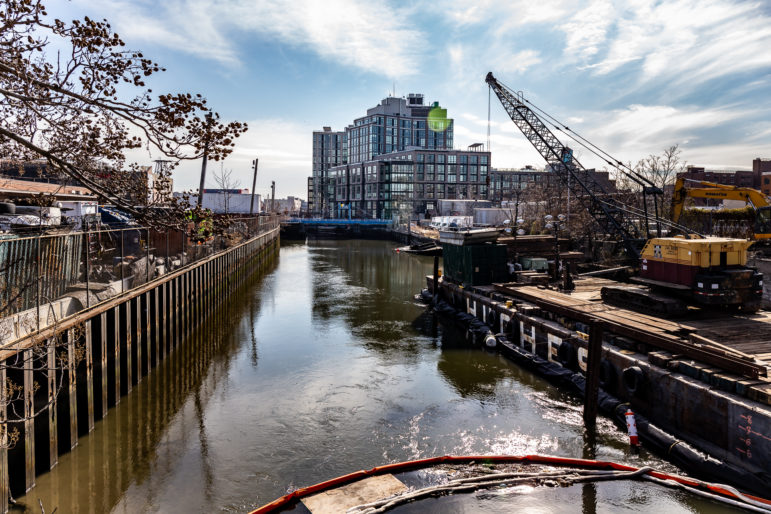Voice of Gowanus announced it would file a lawsuit Friday challenging the city’s plan to hold virtual hearings during the public review of its proposal to rezone the neighborhood, and demanding the de Blasio administration delay the discussions until they can be held in-person.

Adi Talwar
The Gowanus Canal.The community group Voice of Gowanus announced it would file a lawsuit Friday challenging the city’s plan to hold virtual hearings during the public review of its proposal to rezone the neighborhood, and demanding the de Blasio administration delay the discussions until they can be held in-person.
The group has raised concerns previously about the city’s use of virtual meetings, which have been underway since public discussions about the Gowanus rezoning resumed last fall amid the COVID-19 pandemic, halting in-person meetings. Voice of Gowanus called the virtual meetings format “illegal,” saying the online sessions are inaccessible for many Gowanus residents, and that the purpose of public hearings is to allow residents and stakeholders to share their opinions openly and equally. They allege virtual hearings make that impossible. Some members of the Soho and Noho community, where the city has also proposed a rezoning, have shared similar concerns.
The Gowanus rezoning is set to be certified by the City Planning Commission next week, on Jan. 19, after which the proposal will undergo the Uniform Land Use Review Procedure (ULURP), the city’s public land use review process. The lawsuit will challenge the rezoning on multiple grounds, but will focus on the public not being able to fully participate during the ULURP meetings, saying this goes against the city’s own Charter.
“When you’re dealing with a massive project of this scale that is going to impact so many people’s lives, the community must have its voice heard; that is simply not possible with virtual public hearings,” Jason Zakai from Hiller, P.C., the group’s attorney, said in a statement. “There are detailed, step-by-step rules laid out in City law on how to conduct the public review process. They are there for a reason, and the City must follow them, even if that means waiting until the pandemic is over.”
At the onset of the pandemic in March, Mayor Bill de Blasio issued an emergency order to halt the Uniform Land Use Review Procedure (ULURP), the city’s months-long review process for land use proposals like rezonings. The city restarted that process in October, shifting the process to virtual public meetings through NYC Engage, an online portal where people can find information and register to join meetings, either virtually or by phone. Residents can also place requests in advance for language interpreters and other services.
“The U.S. Supreme Court uses remote meetings. So does the New York City Council. These meetings aren’t just legal and obviously appropriate in a pandemic – they have increased participation and opened the process to those unable to attend in-person,” a spokesman for the city’s Law Department said in a statement Friday. “Planning efforts like the Gowanus rezoning are vital to bring affordable housing, economic opportunity and infrastructure like open space to New Yorkers, and they lie at the heart of our COVID-19 recovery. We are confident that we’re fully complying with the law.”
There are two public rezonings expected to get underway this year––both were stalled due to the pandemic––one in Gowanus and the other in Manhattan’s SoHo/NoHo neighborhoods. Public meetings relating to both projects have been held remotely in recent months to plan for the start of ULURP, and city officials say the online format has provided a boost to attendance numbers, with hundreds tuning in.
The Gowanus rezoning plan spans 80 blocks, bounded by Bond Street to the west, Baltic Street to the north, 4th Avenue to the east from Pacific Street to 15th Street, and cutting off near Hamilton Avenue to the south. The city projects the rezoning would trigger the creation of an estimated 8,200 new apartments by 2035.
Voice of Gowanus has been outspoken in its opposition to the rezoning, saying the city should not move forward with any rezoning plans until the Gowanus Canal, an EPA superfund site, and surrounding areas have been remediated by city, state and federal officials and given a clean bill of health.
Other community groups are supportive of the plan after working for years with the city and community to improve the proposal to meet their needs, and have also made specific demands they want the city to include in any rezoning. Community Board 6, the Gowanus Neighborhood Justice Coalition and Councilmembers Brad Lander and Stephen Levin are calling for capital funding for NYCHA repairs to be included in the plan, and have raised concerns over affordable housing and other issues, as well as pushed for environmentally-responsible policies.
The city has yet to include NYCHA funding in the current rezoning proposal. Councilmember Lander, who represents the district and would ultimately approve or reject the plan with his vote in the City Council, has said funding for NYCHA is a bottomline to his supporting the project.










3 thoughts on “Gowanus Group Files Lawsuit Over City’s Use of Virtual Hearings During Rezoning Review”
A judge ordered a temporary restraining order. Great.
Everyone hates Zoom meetings. So deblasio pushes them down people’s throats during a pandemic to save his sullied reputation in the waning days of his lame-duck mayoralty.
If this loser wants to rezone, let him rezone Park Slope, where he lives.
Wow. Who knew the Supreme Court hearings invited public participation? I am definitely going to join by Zoom and let them know what I think about the Constitution.
Hooray for the Gowanus folks. We SoHo/Noho people should join and support them.